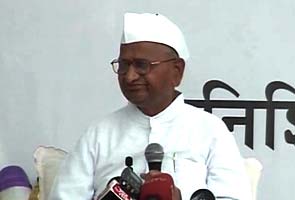
Mr Hazare said this is a "victory of the people".
It took Anna Hazare almost five days of fasting to accomplish every point of an agenda that seemed preposterously ambitious when the week began. Till India pitched in, expressing its solidarity with rallies around Mr Hazare's cause - to force the government to introduce a new tough law to combat corruption, and to ensure that politicians alone are not entrusted with its conception.
So the government has agreed that a committee will be set up with five representatives of civil society, including Mr Hazare, and five ministers. At the head will be a chairman - a senior minister, most likely Pranab Mukherjee, and a co-Chairman, former Law Minister Shanti Bhushan, who has been picked by Mr Hazare.
Sources have told NDTV that Union Law Minister Veerappa Moily, Home Minister P Chidambaram, Telecom Minister Kapil Sibal and Minister for Minority Affairs Salman Khursheed, are likely to be the other government representatives on the panel.
The committee will be notified formally with a government order that will explain its term and references, conferring legislative authority upon it.
While Mr Hazare has his reservations about the title "co-Chairman," he has been assured that the post comes with the same powers and authority as the Chairman's. It was this concern that led to a two-hour delay between the meeting that negotiated the compromise and Mr Hazare's public announcement to end his fast.
The breakthrough came after Mr Hazare's representatives - Kiran Bedi, Swami Agnivesh, and Arvind Kejriwal, all activists in their own right - met with three senior ministers this evening. The government's delegates were Law Minister Veerappa Moily, Telecom Minister Kapil Sibal and Minorities' Affairs Minister Salman Khurshid.
At two meetings - in the morning and evening - Sonia Gandhi and the Prime Minister urged senior ministers to end the impasse.
The government's unprecedented concessions were thrust upon it partly by Sonia Gandhi, who in a statement last night spelled out her support for Mr Hazare's stand and urged him to end his fast. An equal amount of pressure was applied by lakhs of Indians online and offline, who swapped cynicism for a determination to be the change.
That mood reflected this evening at Jantar Manatar in Delhi, a short drive away from where the ministers were finalising a peace treaty with the activists. Six thousand men, women and children sang "We shall overcome". A few minutes later, Mr Hazare addressed them, reassuring them that he was in good health. "You are my strength," he said.
For the last few days, Mr Hazare has with these speeches drawn middle class out of its inertia. For every demand that Mr Hazare presented, the government had an equal and opposite reaction. And slowly, it began conceding one point after another, till it was game, set and match for Mr Hazare.
Union Telecom Minister Kapil Sibal said, "This sets a precedent - it shows how civil society and government can work together. We are happy that we are now ending these days of uncertainty through a resolution in which both sides had confidence in each other."
Mr Sibal expressed hope that the bill would be introduced in the Monsoon Session of Parliament.
The government and activists have today swapped their drafts of the bill - wide differences have existed between the two versions so far.
Since September last year, India has confronted corruption scams of unprecedented scale. The list is topped by a telecom swindle that saw 2G spectrum being sold at throwaway prices in 2008 by then Telecom Minister A Raja. He is now in jail. His actions are estimated to have cost the government upto Rs. 1.76 lakh crore. As a series of financial skeletons have tumbled out of the government's closet, public anger has been esclating. The country needed a rallying point, and Mr Hazare provided an inspiring one.


No comments:
Post a Comment